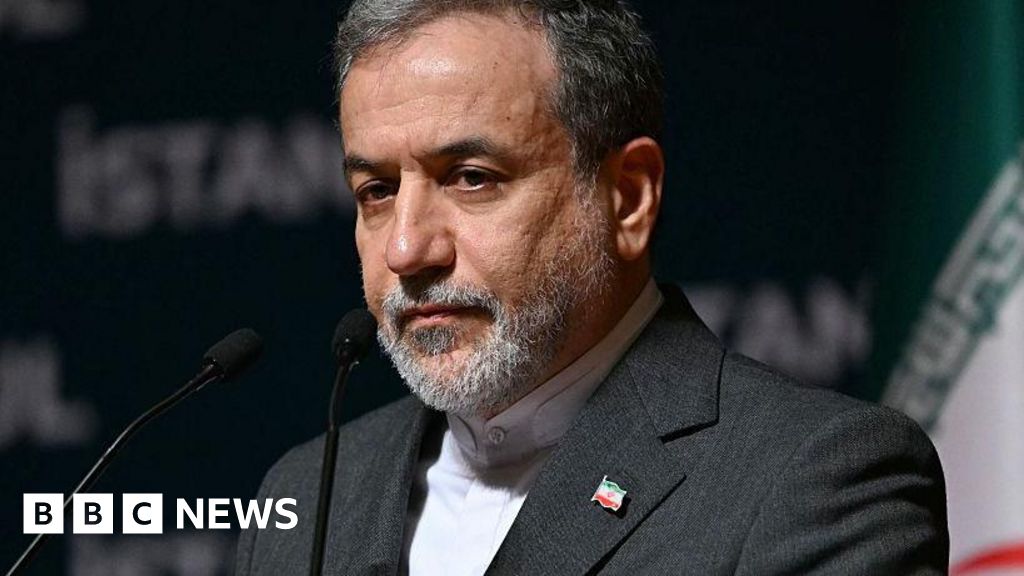Iran's foreign minister has admitted that "excessive and serious" damage was done to the country's nuclear sites in the recent US and Israeli bombings. Abbas Araghchi told a state broadcaster on Thursday evening that an assessment of the damage is being carried out by the Atomic Energy Organisation of Iran. But, just hours earlier, Iran's Supreme Leader Ayatollah Ali Khamenei said the strikes did not disrupt the country's nuclear programme. Khamenei was responding to US President Donald Trump's assertion that the bombs had "totally obliterated" three nuclear sites. Khamenei said the US attacks had failed to "accomplish anything significant". The supreme leader, who has been in hiding since the war with Israel began on 13 June, insisted that Trump had "exaggerated" the impact of the bombs, and declared victory over the US and Israel. But Araghchi's remarks create a different impression. The foreign minister also said there were no plans to resume nuclear talks with the US. Iran cancelled a scheduled sixth round of talks when Israel began its attacks. "I would like to state clearly that no agreement, arrangement or conversation has been made to start new negotiations," he said. He added that the government was examining what was in the "interest of the Iranian people", saying its approach to diplomacy will take a "new form". He did not explain what he meant. In an attempt to bring Iran back to the negotiating table, the Trump administration has discussed the possibility of helping Iran access $30bn to build a civilian-energy-producing nuclear programme, easing sanctions and freeing up billions of dollars in restricted Iranian funds, CNN has reported. But developments in Iran might obstruct such a move. On Wednesday, Iran's parliament approved a bill to stop co-operation with the global nuclear watchdog, the International Atomic Energy Agency (IAEA). If it is implemented, it would mean Iran is no longer committed to allowing nuclear inspectors into its sites. Israel has said its offensive against Iran was necessary to thwart what it claims are Iranian plans to develop nuclear weapons. Iran has always insisted its nuclear programme is only intended for civilian purposes. The US became directly involved in the conflict last weekend, striking facilities in Fordo, Natanz and Isfahan, before Trump sought to rapidly mediate a ceasefire between Israel and Iran. US Defence Secretary Pete Hegseth said intelligence gathered by the US and Israel indicated the strikes "significantly damaged the nuclear programme, setting it back by years". A leaked preliminary Pentagon assessmentdownplayed the significance of the damage and said the US strikes only set Iran's nuclear programme back by a few months. The leak has been dismissed by the administration. Iran's health ministry said 610 people were killed during the 12 days of Israel air strikes, while Israeli authorities said 28 were killed in Israel.
Iranian foreign minister admits serious damage to nuclear sites
TruthLens AI Suggested Headline:
"Iran Acknowledges Significant Damage to Nuclear Sites Amid Ongoing Tensions"
TruthLens AI Summary
Iran's foreign minister, Abbas Araghchi, acknowledged that the recent bombings by the US and Israel inflicted "excessive and serious" damage to the country's nuclear facilities. In a statement to state media, he noted that an assessment of the damage is currently underway, being conducted by the Atomic Energy Organisation of Iran. Contradicting Araghchi's admission, Iran's Supreme Leader Ayatollah Ali Khamenei claimed that the strikes had not significantly disrupted Iran's nuclear program. Khamenei asserted that US President Donald Trump's comments about the bombings obliterating three nuclear sites were exaggerated. He maintained that the attacks did not achieve any substantial outcomes, even as he remained out of the public eye since the onset of hostilities with Israel in mid-June. This divergence in narratives raises questions about the actual impact of the bombings on Iran's nuclear ambitions and operational capabilities.
In the wake of the bombings, Araghchi revealed that Iran has no immediate plans to resume nuclear negotiations with the United States, following the cancellation of a previously scheduled sixth round of talks coinciding with the Israeli attacks. He emphasized that no agreements or discussions have taken place regarding new negotiations, and indicated that Iran's diplomatic approach would evolve to better serve the interests of the Iranian people, although he did not specify how this would manifest. Meanwhile, Iran's parliament passed a bill to halt cooperation with the International Atomic Energy Agency (IAEA), which could limit international oversight of its nuclear activities. The US had previously considered easing sanctions and facilitating access to $30 billion for a civilian nuclear program to encourage negotiations. However, recent developments in Iran, including the parliamentary bill, may complicate these diplomatic efforts. Additionally, the US military's involvement in the conflict has led to significant casualties, with Iran reporting 610 deaths and Israel citing 28 fatalities amid the ongoing air strikes.
TruthLens AI Analysis
You need to be a member to generate the AI analysis for this article.
Log In to Generate AnalysisNot a member yet? Register for free.
